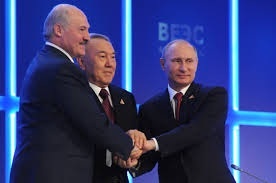Co-authored by William Witenberg a contemporary artist focused on abstract painting
There can be little doubt there have been consequences to the failure of President Obama to follow through on his threat to Syria to not "cross the line" and the mildness of the sanctions imposed on Russia after both the annexation of Crimea and Russian support for the Eastern Ukrainian separatists. The consequences of the unenforced threat and weak sanctions have served to embolden China's foreign policy and to cause Putin to focus on his economic relationships outside of Western Europe, strengthening Russia's economic ties with China.
Putin is further developing economic bonds with Eurasia, as shown last week when Russia, Kazakhstan and Belarus signed a treaty that created the Eurasian Economic Union (EEU), a partnership that is modeled in economics, but not politics after the European Union. It is expected that Armenia and Kyrgyzstan will join this year. The EEU is compromised of approximately 170 Million people, 20% of the world's natural gas and 15% of the world's oil.
America has long objected to the creation of the EEU, because it views it as an attempt to recreate the USSR. Hilary Clinton, while Secretary of State, said... "we are trying to figure effective ways to slow down or prevent it." However, for Putin no matter how weak the EU sanctions, as a result of the turmoil in Ukraine were, it was still a destabilizing force. It is clear that he wants to reduce Russian economic dependence on Europe. This is one large step.
Even the creation of EEU cannot compete in significance with the Gazprom's 30-year, $400 billion deal to pipe natural gas from Russia's Far East to China. As Forbes has pointed out "...the agreement (has the) potential to reshape global energy markets and tilt the balance of influence in Ukraine and, more broadly, in Europe." If there is one major consequence, of the threat of sanctions over Ukraine, this is it, sanctions effectively brought China and Russia closer.
Not only does this deal assure Russia a major client for decades and reduce its need to sell to Europe, but it also reduces the possibility of America's natural gas industry competing in Asia. For China, it represents an assured source of relatively inexpensive natural gas to fuel its continued rapid growth.
The security conference held last week with America and Asian countries in Singapore, underlined how aggressive China has been in Asia recently. The failure of he Obama's administration to not follow through on "the line crossed" in Syria and the weak sanctions over Ukraine could only have served to remind China that President Obama will accept a reduced sphere of influence in Asia.
When Mr. Hagel accused China of "intimidation and coercion" and "undertaken(ing) destabilizing, unilateral actions asserting its claims in the South China Sea." The hollow threat of John Kerry's words to Russia over the Ukraine had to be heard in these words by the Chinese.
The implications of America's empty threat of sanctions and false line drawing have not been lost on Russia or China. It appears that this is also the beginning of an era of decreased involvement of US on the world stage, especially in the East.
